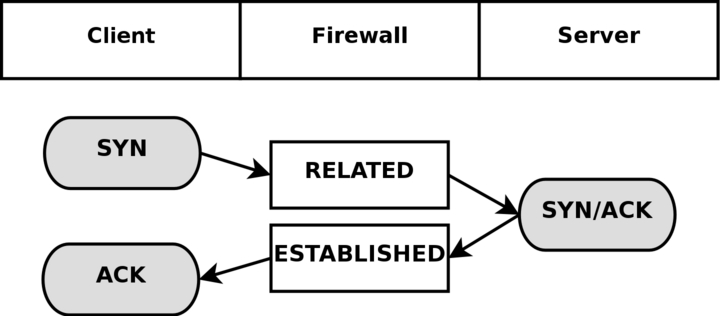Книга: Iptables Tutorial 1.2.2
Complex protocols and connection tracking
Complex protocols and connection tracking
Certain protocols are more complex than others. What this means when it comes to connection tracking, is that such protocols may be harder to track correctly. Good examples of these are the ICQ, IRC and FTP protocols. Each and every one of these protocols carries information within the actual data payload of the packets, and hence requires special connection tracking helpers to enable it to function correctly.
This is a list of the complex protocols that has support inside the linux kernel, and which kernel version it was introduced in.
Table 7-3. Complex protocols support
| Protocol name | Kernel versions |
|---|---|
| FTP | 2.3 |
| IRC | 2.3 |
| TFTP | 2.5 |
| Amanda | 2.5 |
• FTP
• IRC
• TFTP
Let's take the FTP protocol as the first example. The FTP protocol first opens up a single connection that is called the FTP control session. When we issue commands through this session, other ports are opened to carry the rest of the data related to that specific command. These connections can be done in two ways, either actively or passively. When a connection is done actively, the FTP client sends the server a port and IP address to connect to. After this, the FTP client opens up the port and the server connects to that specified port from a random unprivileged port (>1024) and sends the data over it.
The problem here is that the firewall will not know about these extra connections, since they were negotiated within the actual payload of the protocol data. Because of this, the firewall will be unable to know that it should let the server connect to the client over these specific ports.
The solution to this problem is to add a special helper to the connection tracking module which will scan through the data in the control connection for specific syntaxes and information. When it runs into the correct information, it will add that specific information as RELATED and the server will be able to track the connection, thanks to that RELATED entry. Consider the following picture to understand the states when the FTP server has made the connection back to the client.

Passive FTP works the opposite way. The FTP client tells the server that it wants some specific data, upon which the server replies with an IP address to connect to and at what port. The client will, upon receipt of this data, connect to that specific port, from its own port 20(the FTP-data port), and get the data in question. If you have an FTP server behind your firewall, you will in other words require this module in addition to your standard iptables modules to let clients on the Internet connect to the FTP server properly. The same goes if you are extremely restrictive to your users, and only want to let them reach HTTP and FTP servers on the Internet and block all other ports. Consider the following image and its bearing on Passive FTP.

Some conntrack helpers are already available within the kernel itself. More specifically, the FTP and IRC protocols have conntrack helpers as of writing this. If you can not find the conntrack helpers that you need within the kernel itself, you should have a look at the patch-o-matic tree within user-land iptables. The patch-o-matic tree may contain more conntrack helpers, such as for the ntalk or H.323 protocols. If they are not available in the patch-o-matic tree, you have a number of options. Either you can look at the CVS source of iptables, if it has recently gone into that tree, or you can contact the Netfilter-devel mailing list and ask if it is available. If it is not, and there are no plans for adding it, you are left to your own devices and would most probably want to read the Rusty Russell's Unreliable Netfilter Hacking HOW-TO which is linked from the Other resources and links appendix.
Conntrack helpers may either be statically compiled into the kernel, or as modules. If they are compiled as modules, you can load them with the following command
modprobe ip_conntrack_ftp
modprobe ip_conntrack_irc
modprobe ip_conntrack_tftp
modprobe ip_conntrack_amanda
Do note that connection tracking has nothing to do with NAT, and hence you may require more modules if you are NAT'ing connections as well. For example, if you were to want to NAT and track FTP connections, you would need the NAT module as well. All NAT helpers starts with ip_nat_ and follow that naming convention; so for example the FTP NAT helper would be named ip_nat_ftp and the IRC module would be named ip_nat_irc. The conntrack helpers follow the same naming convention, and hence the IRC conntrack helper would be named ip_conntrack_irc, while the FTP conntrack helper would be named ip_conntrack_ftp.
- Creating a Second Connection
- Системные переменные ROWS_AFFECTED, GDSCODE, SQLCODE, TRANSACTIONJD, CONNECTIONJD
- Разработка приложений баз данных InterBase на Borland Delphi
- Open Source Insight and Discussion
- CONNECTION TIMEOUT
- Introduction to Microprocessors and Microcontrollers
- Chapter 6. Traversing of tables and chains
- Chapter 8. Saving and restoring large rule-sets
- Chapter 11. Iptables targets and jumps
- Chapter 5 Installing and Configuring VirtualCenter 2.0
- Chapter 16. Commercial products based on Linux, iptables and netfilter
- Appendix A. Detailed explanations of special commands




